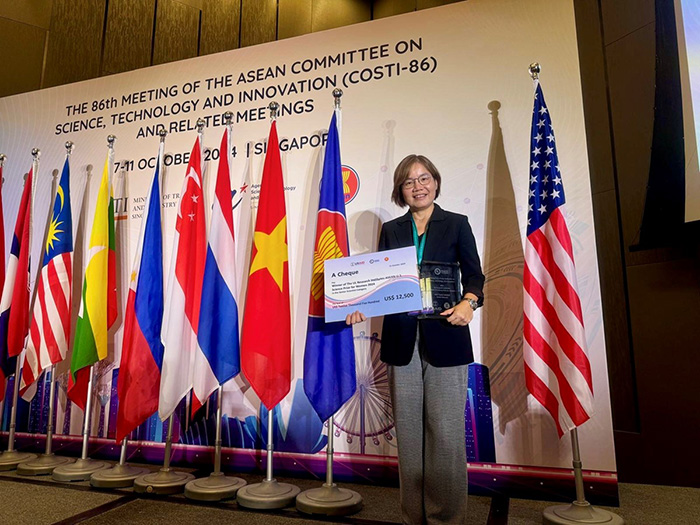We are proud to share that Professor Lam Yeng Ming has been named the Winner of the 2024 UL-ASEAN-U.S. Science Prize for Women (Senior Scientist category). Professor Lam was one of the two regional finalists in the Senior Scientist category who competed in a head-to-head pitch competition on 11 October 2024 at the 86th Meeting of the ASEAN Committee on Science, Technology, and Innovation (COSTI-86) in Singapore. She was recognised for her scientific contributions in developing functional nanostructured materials for a sustainable environment, which reflects this year's prize theme—Climate Resilience and Adaptation.

Advancing Energy Harvesting and Generation
Professor Lam's research in solar energy harvesting has significantly advanced perovskite photovoltaic cell technology. In a collaborative effort with Professor Sum Tze Chien from the School of Physical and Mathematical Sciences (SPMS), her team discovered a new method for creating a lead-free 2-D capping layer for perovskite solar cells. Their fabricated solar cell, as reported in Nature (2023), achieved an impressive 24.1% solar cell efficiency while maintaining stability and performance over an extended period. This breakthrough holds great promise for sustainable energy solutions.
Advancing Sustainable Agriculture and Urban Farming
Rising temperatures and longer unpredictable periods of drought are consequences of climate change. Only 10.8% of the world's total land area is arable. To combat this, Professor Lam developed a nanogel technology called
RentenSol-G that significantly improves soil wettability and water retention. This technology has the potential to transform non-arable land into fertile farming grounds, leading to more sustainable agricultural practices worldwide. Professor Lam's team has collaborated with the Singapore National Parks Board (NParks) to improve water usage efficiency and with the Singapore Housing & Development Board (HDB) to enhance rooftop farming initiatives. Their nanogel technology was recognised through the
Mitsui Chemicals Award at the Tech Plan Demo Day by Leave a Nest/Tech Planter and the
Cool Ideas Enterprise Award by HDB in 2018. Furthermore, they are collaborating with Panasonic Factory Solutions Asia Pacific Pte Ltd to develop alternative and renewable substrates for food production. Professor Lam's research also extends to environmental restoration through phytoremediation—using plants to extract and store contaminants from soil. Her extensive study on heavy metals in Singapore soils and plant foliage has identified native and naturalised plant species with phytoremediation potential (
Environmental Pollution, 2022). Her team is currently developing nanomaterials to enhance the growth and capability of plants for phytoremediation. Additionally, Professor Lam is collaborating with Indonesian universities on restoration projects, including reclaiming mining areas and extracting valuable resources to promote sustainability and economic growth.
Exploring Sustainable Polymer Degradation Mechanisms
Recently, Professor Lam has been working on sustainable polymer degradation mechanisms to combat the environmental crisis caused by plastic waste. Her group explored the impact of polyethylene terephthalate (PET) chain structure on its enzymatic degradation behaviour. They found that specific chemical modifications, such as incorporating kinks and branches, significantly improved the enzymes' ability to break down PET (
ACS Sustainability Chemistry & Engineering, 2023). The study paves the way for designing PET plastics that are more susceptible to enzymatic degradation after their lifespan. The team's findings on polymer degradation also extend to other plastics, such as polyamide 6 (PA6), a widely used engineering plastic found in textiles and automotive parts. They uncovered the degradation mechanisms of PA6 during mechanical recycling, identifying chain scission at the N-alkylamide bond as the primary degradation mechanism rather than the scission of the peptide bond, as suggested by some earlier studies (
Polymer Degradation and Stability, 2024). This work lays the foundation for developing targeted strategies to preserve the properties of recycled PA6, enabling the production of high-quality recycled nylon for various applications. These insights contribute to the progress of a circular economy for plastics.
About the 2024 UL-ASEAN-U.S. Science Prize for Women
The United States Government, in partnership with the Association of Southeast Asian Nations (ASEAN) and UL Research Institutes, aims to strengthen ASEAN science and technology capacity and gender equality through an annual UL Research Institutes-ASEAN-U.S. Science Prize for Women (“Prize”). The 2024 Prize will provide promising, ASEAN-national, Mid-career and Senior female scientists with recognition awards from ASEAN and the United States government and UL Research Institutes for their academic and professional achievements. The 2024 Prize will emphasise the role of female scientists who have used their work to improve society in sustainable ways and have acted as role models for other women learning, working in, and pursuing careers in science, technology, engineering and math (STEM). This year, the Prize focuses on the theme of Climate Resilience and Adaptation. Along with recognition for their achievements, the winners are eligible to receive a cash award of $12,500 each for both the Senior Scientist and the Mid-career Scientist categories. Additionally, the runner-up finalists in each category will receive an honourable mention and $5,000.








